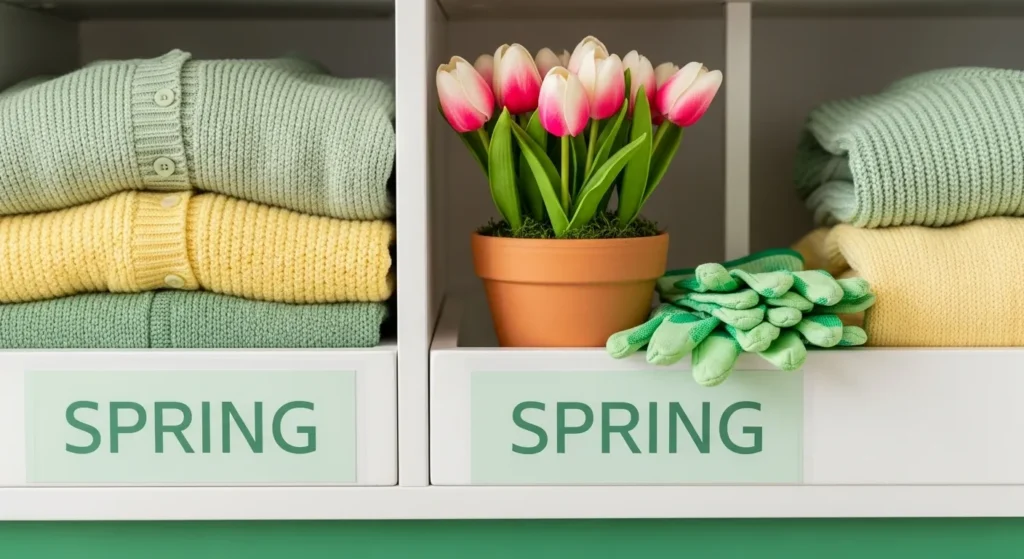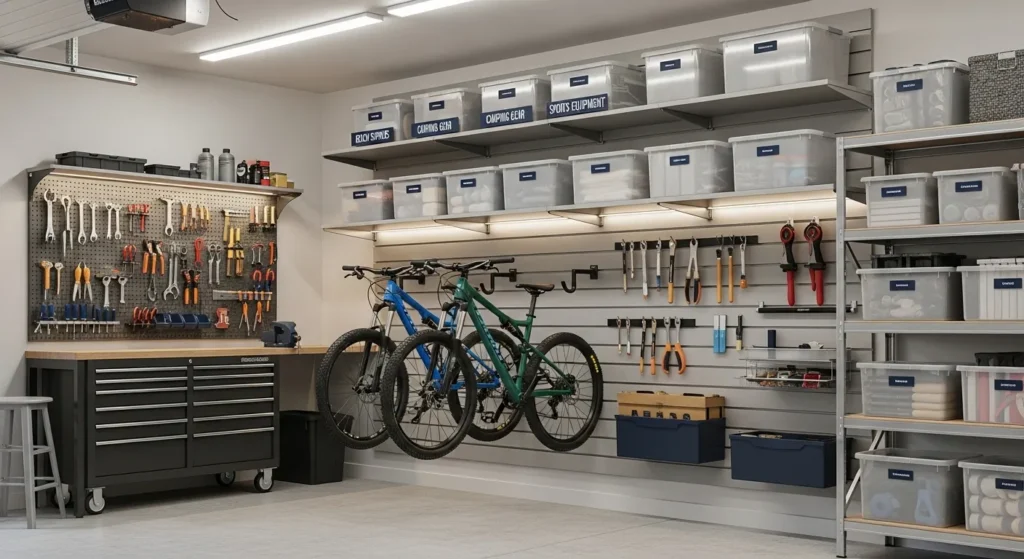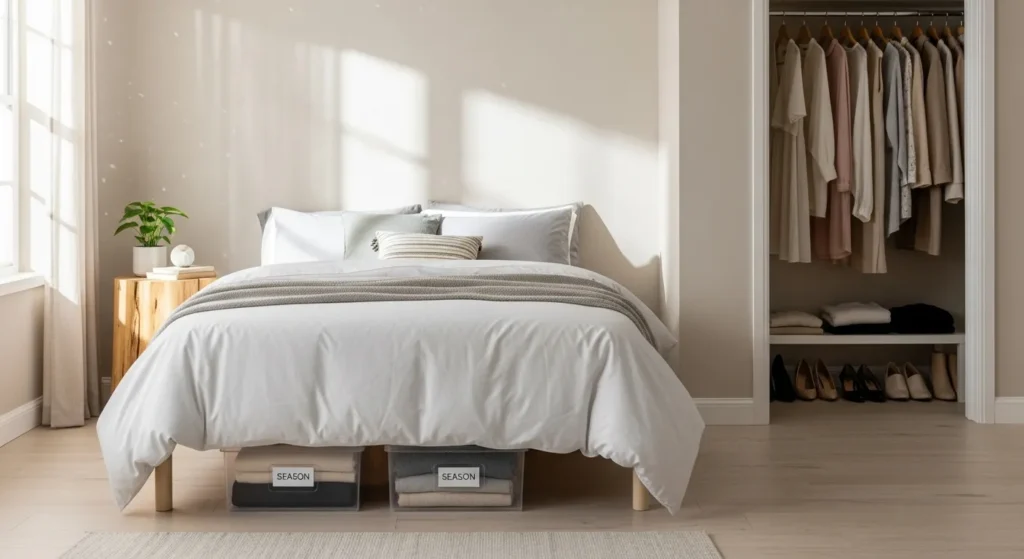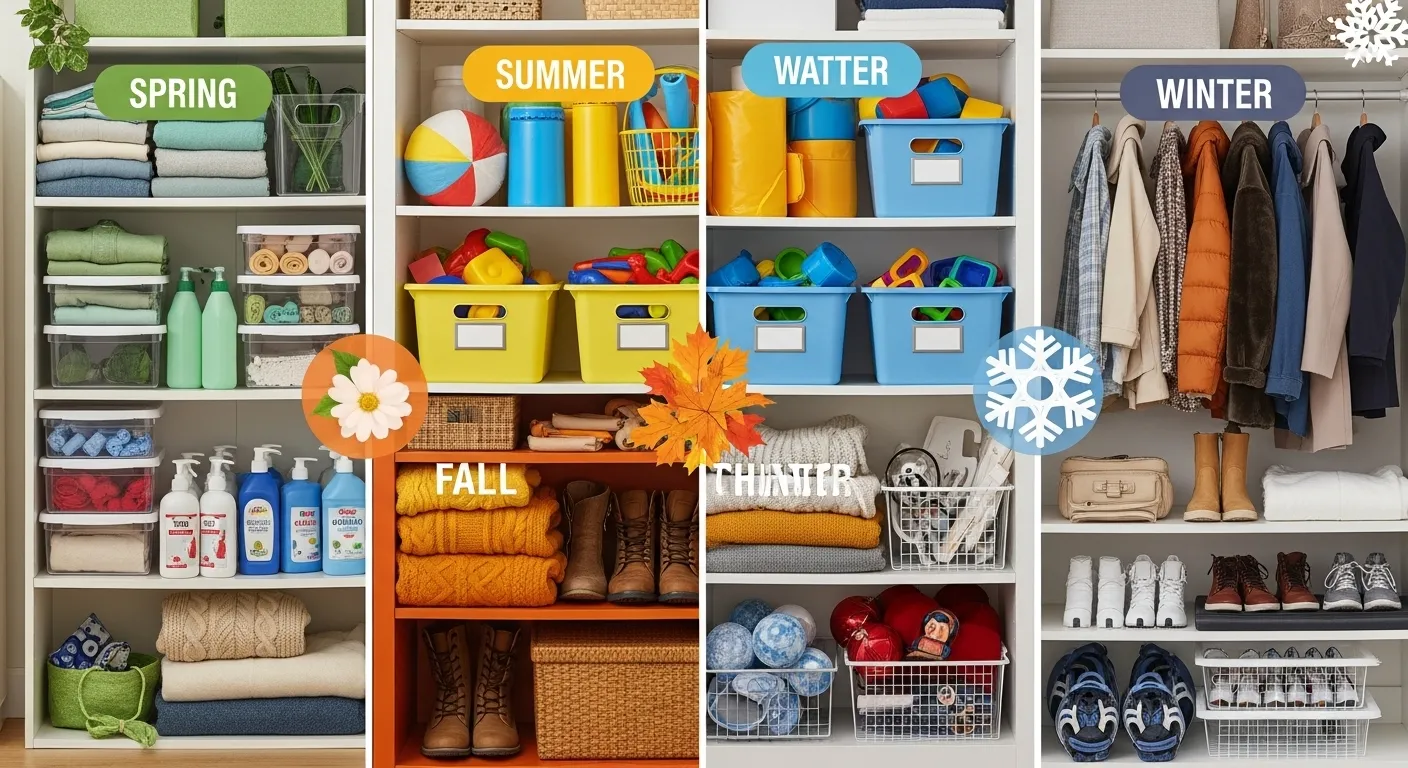Changing seasons brings new challenges for home organization. Your summer gear needs storage while winter coats take over closets. Holiday decorations crowd storage areas before disappearing for months. Managing these seasonal shifts doesn’t have to create chaos in your home.
Smart seasonal organization systems keep your space functional and clutter-free throughout the year. These proven strategies work for busy families who want organized homes without spending entire weekends rearranging storage areas.
Why Seasonal Organization Matters for Your Home
Seasonal home organization is not just about storage; it’s about creating a living space that reflects the current season’s activities, celebrations, and weather conditions, ensuring that your home supports your lifestyle efficiently.
When you organize by season, you:
- Free up daily-use storage space
- Reduce time spent searching for seasonal items
- Protect belongings from damage during storage
- Create room for current season necessities
- Maintain a clutter-free environment year-round

The Foundation: Seasonal Decluttering Strategy
The foundation of effective seasonal organization is thorough decluttering. Start each seasonal transition by evaluating what you actually used during the previous season.
Seasonal Decluttering Checklist:
- Clothing: Remove items you didn’t wear this season
- Decorations: Eliminate broken or outdated holiday items
- Sports Equipment: Donate gear your family outgrew
- Outdoor Items: Discard worn or unsafe equipment
- Kitchen Items: Clear expired seasonal ingredients
The Three-Question Method:
Ask these questions for each item:
- Did I use this during the past season?
- Is it in good condition for next year?
- Do I have space to store it properly?
If you answer “no” to any question, consider donating or discarding the item.
Spring Organization: Fresh Start Systems
Spring cleaning extends beyond deep cleaning. It’s your chance to organize for the active months ahead.
Spring Clothing Rotation
- Store heavy winter coats in vacuum bags
- Bring out lighter jackets and rain gear
- Pack away wool sweaters and thermal underwear
- Make space for spring and summer clothing
Outdoor Equipment Organization
- Clean and store winter sports equipment
- Organize gardening tools and supplies
- Prepare outdoor furniture and cushions
- Set up storage for spring cleaning supplies
For more detailed closet organization strategies, check our guide on closet organization ideas for small spaces which includes space-saving techniques perfect for seasonal rotations.
Spring Home Maintenance Integration
Combine organization with seasonal maintenance:
- Clean and organize garage while checking for winter damage
- Sort through basement storage while looking for moisture issues
- Organize garden shed while preparing tools for the season
Summer Organization: Maximizing Active Season Storage
Summer brings outdoor activities, vacation gear, and entertaining supplies that need accessible storage.
Summer Activity Organization
Create designated zones for:
- Beach and Pool Supplies: Towels, sunscreen, toys, and floats
- Camping Gear: Tents, sleeping bags, and cooking equipment
- Sports Equipment: Bikes, balls, and outdoor games
- Entertainment Items: Portable speakers, outdoor games, and picnic supplies
Climate-Controlled Storage Solutions
Summer heat can damage stored items. Protect off-season belongings by:
- Using climate-controlled areas for delicate items
- Avoiding attic storage for heat-sensitive materials
- Choosing basement storage over garage space when possible
- Using moisture absorbers in storage containers

Fall Organization: Preparing for Indoor Months
Fall organization focuses on preparing your home for more indoor time and holiday entertaining.
Fall Clothing Transition
- Bring out sweaters, boots, and heavier jackets
- Store summer clothing in labeled containers
- Make space for winter outerwear
- Organize seasonal accessories like scarves and gloves
Holiday Preparation Organization
Start preparing storage for the holiday season:
- Clear space in designated holiday decoration storage area
- Organize gift-wrapping supplies and storage
- Create accessible storage for entertaining items
- Prepare guest room organization for holiday visitors
Cozy Season Setup
Organize items that make your home comfortable during colder months:
- Bring out extra blankets and throws
- Organize indoor entertainment items
- Set up reading nooks with good lighting
- Arrange board games and puzzle storage
Winter Organization: Indoor Focus and Holiday Management
Winter organization centers around efficient indoor storage and managing holiday item overflow.
Winter Clothing Storage Systems
- Create easy access to everyday winter wear
- Store bulky items like snow pants efficiently
- Organize winter accessories in accessible locations
- Rotate clothing as temperature drops
Holiday Decoration Management
The holiday season creates unique organization challenges:
- Use clear, labeled bins for each holiday
- Store decorations by room or theme
- Keep frequently used items easily accessible
- Plan storage before bringing out decorations
Indoor Activity Organization
Winter means more indoor time. Organize accordingly:
- Create accessible storage for indoor hobbies
- Organize entertainment systems and supplies
- Set up efficient cooking and baking storage
- Arrange comfortable reading and relaxation areas
Room-by-Room Seasonal Organization
Kitchen Seasonal Organization
Your kitchen needs different tools and ingredients throughout the year:
Spring/Summer Kitchen:
- Lighter cookware and grilling tools
- Fresh herb storage solutions
- Picnic and outdoor eating supplies
- Cold beverage preparation items
Fall/Winter Kitchen:
- Heavy pots for stews and soups
- Baking supplies and holiday cooking tools
- Hot beverage stations
- Comfort food ingredient storage
Bedroom Seasonal Organization
Bedrooms require different textiles and clothing access by season:
Warm Weather Setup:
- Lightweight bedding and breathable fabrics
- Summer clothing in accessible locations
- Minimal layers and coverings
- Cool, airy storage solutions
Cold Weather Setup:
- Heavier bedding and warm textures
- Winter clothing easily accessible
- Extra blankets and throws available
- Cozy accessories within reach

Garage and Storage Area Organization
These spaces often handle the bulk of seasonal storage:
Organization Principles:
- Store current season items at eye level
- Use vertical space for out-of-season items
- Label everything clearly with season and contents
- Create pathways for easy access
- Group similar items together regardless of season
Storage Solutions for Every Season
Container and Labeling Systems
Effective seasonal storage relies on smart container choices:
Best Container Options:
- Clear plastic bins for easy identification
- Vacuum bags for soft items like bedding
- Sturdy boxes for heavier items
- Garment bags for delicate clothing
Labeling Best Practices:
- Include season and general contents
- Use color coding for quick identification
- Add dates for time-sensitive items
- Take photos of container contents for reference
Space-Saving Storage Techniques
Maximize your storage space with these methods:
- Use vacuum bags for bulky soft items
- Stack containers by season frequency
- Utilize under-bed space for off-season clothing
- Install ceiling storage for rarely used items
Climate Considerations for Storage
Different items require different storage conditions:
Temperature-Sensitive Items:
- Store photographs in stable temperatures
- Keep electronics away from extreme heat or cold
- Protect leather goods from humidity changes
- Store holiday lights in moderate temperatures
Creating Your Seasonal Organization Schedule
Quarterly Organization Sessions
Plan four major organization sessions each year:
March – Spring Preparation:
- Store winter items
- Prepare summer clothing and gear
- Plan outdoor space organization
- Schedule home maintenance tasks
June – Summer Setup:
- Organize for peak outdoor activity
- Store spring items no longer needed
- Prepare vacation and travel gear
- Create entertainment storage systems
September – Fall Transition:
- Store summer items carefully
- Prepare for holiday season storage needs
- Bring out fall and winter clothing
- Organize indoor activity supplies
December/January – Winter Organization:
- Manage holiday decoration overflow
- Store fall items
- Organize winter gear for easy access
- Plan for next year’s improvements
Monthly Maintenance Tasks
Keep your seasonal organization running smoothly:
- Check storage areas for any issues
- Rotate items as weather changes
- Update inventory lists
- Address any storage problems immediately
Family-Friendly Seasonal Organization
Getting Everyone Involved
Seasonal home organization is a task best tackled as a team. Make organization a family activity:
Age-Appropriate Tasks:
- Young Children (3-6): Sort items by color or type
- School Age (7-12): Pack their own seasonal clothing
- Teenagers (13+): Manage their own storage areas and help with family spaces
Teaching Seasonal Organization Skills
Help family members understand the system:
- Explain why seasonal organization helps everyone
- Show children where their seasonal items are stored
- Create simple systems they can maintain independently
- Celebrate successful seasonal transitions
Advanced Seasonal Organization Strategies
Digital Organization Support
Use technology to support your physical organization:
- Create digital inventories of stored items
- Use apps to track seasonal task schedules
- Take photos of storage areas for reference
- Set reminders for seasonal transitions
Seasonal Maintenance Integration
Combine organization with home maintenance:
- Check stored items while doing seasonal home maintenance
- Use organization time to inspect storage areas
- Address any storage issues while organizing
- Plan improvements for next season
For eco-friendly cleaning supplies that work well during seasonal organization, check our guide to eco-friendly laundry detergents which can help keep stored items fresh and clean.
Troubleshooting Common Seasonal Organization Problems
When Storage Systems Fail
Address these common issues:
Problem: Items don’t fit in designated storage Solution: Reevaluate what you’re keeping and consider larger containers or different storage locations
Problem: Family members don’t follow the system Solution: Simplify the system and involve them in creating solutions that work for their habits
Problem: Seasonal items get damaged in storage Solution: Improve storage conditions and invest in better protective containers
Adapting Systems Over Time
Your seasonal organization needs will change:
- Adjust systems as family size changes
- Update storage as children grow
- Modify organization as living space changes
- Refine systems based on what works best
Planning Next Season During Current Season
Proactive Organization Thinking
Plan ahead for smoother transitions:
- Note what seasonal items you need while using them
- Identify storage problems before they become major issues
- Plan improvements during off-seasons
- Budget for storage solutions throughout the year
End-of-Season Evaluation
Before storing seasonal items, evaluate:
- What worked well this season?
- What items didn’t get used?
- What storage improvements are needed?
- What should be replaced before next season?
Making Seasonal Organization Sustainable
Building Habits That Last
Create systems you can maintain long-term:
- Start with small, manageable areas
- Build one successful system before expanding
- Choose solutions that work for your family’s lifestyle
- Regularly evaluate and adjust systems
Seasonal Organization Benefits
Well-organized seasonal storage provides:
- Reduced stress during season changes
- More usable space in your home year-round
- Protected belongings that last longer
- Easier entertaining and holiday preparation
- More time for enjoyable seasonal activities
The key to successful seasonal organization lies in creating simple systems that work for your family’s specific needs. Start with one area, perfect that system, then expand to other spaces. With consistent effort, seasonal transitions become smooth, predictable events that enhance rather than disrupt your home life.
Remember that seasonal organization is an ongoing process, not a one-time project. Each season offers opportunities to refine your systems and improve your home’s functionality. The time invested in setting up good seasonal organization pays dividends in reduced stress, more usable space, and a home that truly supports your family’s lifestyle throughout the year.
